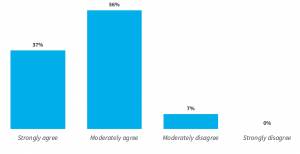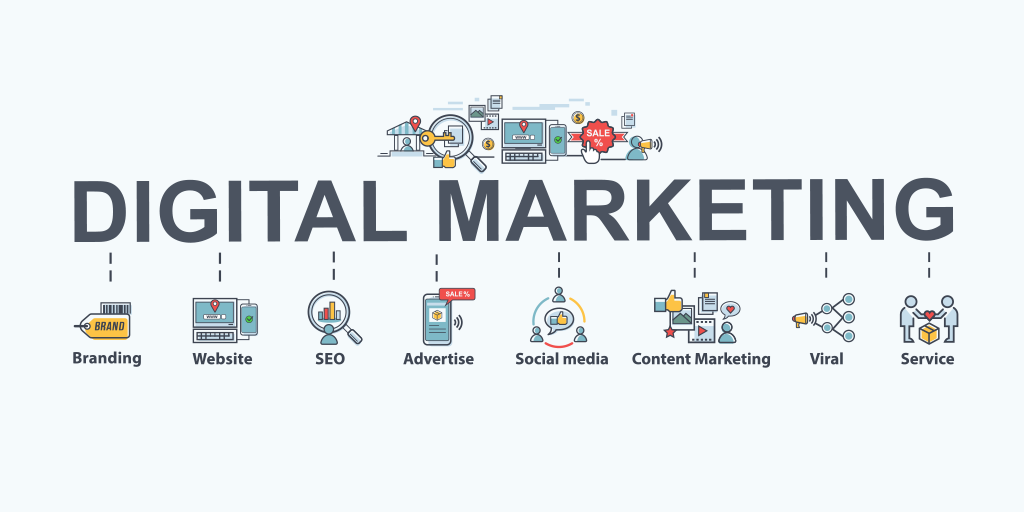
The technology that marketers utilize revolves around the needs and expectations of their audiences and what is required to deliver the best possible experience to them. As these needs shift, so does the martech landscape
So what does this evolving martech landscape look like now and in the year ahead for middle-market companies?
To help you answer this question, Ascend2 and GetResponse fielded The Outlook on Marketing Technology survey.
This report, titled The Outlook on Marketing Technology for Middle-Market Organizations, represents the opinions of the 135 marketing professionals responding to the survey
from mid-size organizations with 50 to 500 employees.
This research has been produced for your use.
Put it to work in your own marketing strategy. Clip the charts and write about them in your blog or post them on social media. Please share this research credited as published.
For middle-market companies, customer experience is top-of-mind as marketers implement new solutions and optimize their tech stacks in the coming year. Increasing engagement is also an important goal for 45% of mid-market marketers surveyed. By delivering targeted customer experiences, marketers encourage engagement and loyalty from their audiences.
What are the MOST IMPORTANT GOALS when implementing or optimizing marketing technology in the year ahead? (Graph.1)
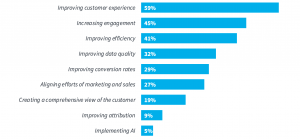
Gauging Strategic Success
It is critical for growing businesses to constantly evaluate the role technology plays in overall strategic success. While one-in-five (20%) marketers for mid-size organizations report best-in-class success from their martech stacks, nearly three-quarters (74%) of those surveyed are just somewhat satisfied with the ability of their current technology to help achieve strategic goals.
How SUCCESSFUL is your (or your typical client’s) marketing technology stack at helping you to achieve strategic goals? (Graph.2)
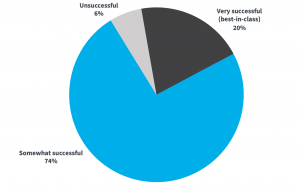
Updating the Tech Stack
Are mid-market companies able to improve performance through the use of their current marketing technology, or will replacing and/or updating solutions be necessary in the coming year? Nearly three- quarters (62%) of marketing professionals for mid-market companies report that they will need to update components of their marketing technology stack in the year ahead in order to meet goals.
In order to achieve your strategic goals, do you feel that you will need to update any or all component(s) of your marketing technology stack in the year ahead? (Graph.3)
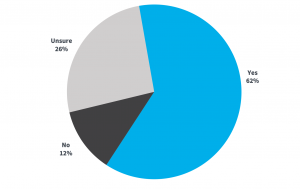
Number of Tools Utilized
Nearly two-thirds (64%) of middle-market companies have martech stacks that are comprised of three to five solutions according to this research. Another 20% of marketers report that their mid-size company operates with one or two tools in their tech stack. By limiting the number of tools used, marketers are able to control the experience delivered throughout the entire customer journey.
How many tools does your marketing technology stack currently consist of? (Graph.4)
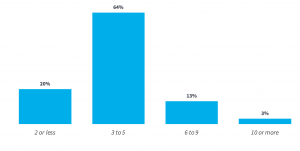
Current Functionality
What do the marketing technology stacks for mid-market companies currently look like? Email marketing and communication solutions are
most commonly included in the martech stacks of those marketers surveyed. Social media, collaboration technology and Customer Relationship Management (CRM) tools are also included in the tech stacks of 56%, 55% and 42% of middle-market marketers surveyed, respectively.
Which of the following functions does your marketing technology stack CURRENTLY INCLUDE? (Graph.5)
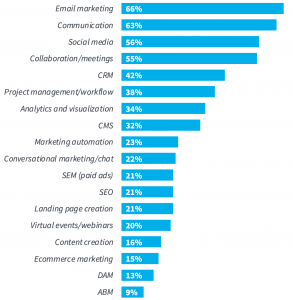
Utilizing Artificial Intelligence
Artificial Intelligence (AI) has become more accessible to businesses of all sizes. 44% of mid-market
organizations surveyed say that they plan to utilize AI in their email marketing strategy in the year ahead. Mid-sized companies will also be using AI to enhance their analytics and reporting, live chat capabilities and content creation according to 30%, 29% and 26% of marketers surveyed, respectively.
In which areas will artificial intelligence (AI) be UTILIZED in the year ahead? (Graph.6)
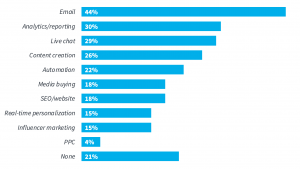
The Importance of First-Party Data
As organizations make customer data privacy a higher priority and third-party cookie deprecation on the horizon, it is no surprise that mid-market companies consider the collection, analysis and use of first- party data a critical component to their overall strategic success in the coming year. 93% of marketers surveyed agree that first-party data will be a key component of their 2022 strategy.
The collection, analysis and use of first-party data will be critical to the success of my organization’s marketing strategy in the year ahead. (Graph.7)
